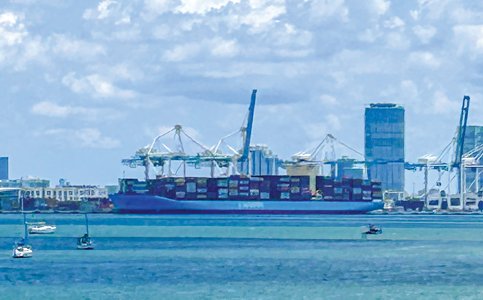Advertisement

Reverberations of a three-day port strike that briefly crippled PortMiami and stretched from Maine to Texas have led to disruptions and raised concerns for the upcoming months.
“There’s about 72 or 73 ships out and anchored between the East Coast and the Gulf with about half a million containers that have to be unloaded; they’re not going to be able to be unloaded all on time,” said Gary Goldfarb, chief strategy officer of Miami-based Interport Logistics. “Some ships made it to port today [Oct. 4] and some more tomorrow, Sunday and then Monday and Tuesday. It is most probably going to take a week to unload all of those containers.”
“Now you have empty ships in the wrong places,” he said, “and you have full ships in the wrong places, and some of us who use L.A. as an outlet just in case have merchandise in the wrong place. That’s a problem. That’s a pretty serious problem.”
The East Coast and Gulf of Mexico work stoppage strike, which began last Monday night and ended Thursday evening, impacted ports from Maine to Texas. The International Longshoremen’s Association (ILA) and the United States Maritime Alliance’s (USMX) unresolved negotiations on a new master contract led to last week’s strike as the six-year contract expired at midnight Sept. 30. The strike ended as the ILA and the USMX reached a tentative agreement on wages and the master contract was extended until Jan. 15.
“Sept. 30,” said Sean P. Gazitúa, president and CEO of WTDC, “we received as many containers as we could that were available…. We don’t like to leave anything loaded outside, so we unloaded them at our facility or at wherever other, because it’s not only our facility in Miami, we also have shipments that are outside of Miami, and we made sure that those were unloaded. Unfortunately, the containers couldn’t go back to the port, so they had to stay within the facility and wait until today [Oct. 4], actually. This morning, when I drove into the warehouse, everything was getting picked up … it’s been busy.”
The agreement was an interim or temporary agreement pushed to Jan. 15, said Mr. Goldfarb. “Kicking the can down the road to Jan. 15 …. We didn’t deal with the trouble. We just push the trouble away. The longshoremen are getting more money, which is a good thing, because they should get more money, but nobody decided [on] the third issue … automation.”
Longshoremen don’t want automation, but the rest of the world is automated, said Mr. Goldfarb. “We’re going to have the dumbest, least modern ports in the world, while the rest of the world has these great ports.”
When there is no automation, said Mr. Goldfarb, and it takes a long time to unload the containers and it’s costly, “they’re going to serve themselves directly from other countries, and we’re not going to participate. That’s a real problem, and something that should be rectified in the next Jan. 15 agreement.”
Jan. 15 looms as issues continue to be raised.
“The federal government didn’t allow one airline to acquire another because they said it was monopolistic,” said Mr. Goldfarb. “We broke up a telephone company AT&T because it was monopolistic. But the ILA has a monopoly over ports…. There’s a lot of issues to resolve.”
Mr. Goldfarb said he believes there’s an absolute threat. An interim or temporary agreement is temporary, “so they got a raise, but they’re going to see how everybody behaves because they may want more of a raise, or they’re going to see how everybody behaves because they may want more control over A or over B or over C, and the customers pay and my customers’ customers pay.”
Plans are in motion to get back on track. However, delays will reflect the impact of the work stoppage.
Mr. Goldfarb said they are trying to unload and get as many containers as possible out of the port. Ships are slow. “Until most probably mid November or early December, we’re going to have ships in the wrong places.”
The first step is communicating with customers and making sure they understand where everything is regarding the agreement with ILA and the ports, but also where their shipments are, said Mr. Gazitúa. “There will be a lot of containers that need to get worked on, but we’ll get to them.
Unfortunately, the inventory that they’re expecting to occur this week is not going to occur this week, and then potentially might not occur next week.”
Congestion has impacted the conversation.
Ships are synchronized, said Mr. Goldfarb. “When you desynchronize the ship because you have an area like the East Coast and Gulf that’s going to have a problem, it throws everything off kilter. Now you’re going to have empty ships in the East Coast that nobody loaded, containers to load onto those ships, because there was a strike. We didn’t know that we could export. It’s going to be very interesting for the next, I’d say, 45 days.”
The difference between the private sector and unionized environments, said Mr. Goldfarb, is that the union “will wait until the next contract. In the private sector, we already gave all our employees a raise months ago because they couldn’t afford to live. They wait for a contract and then six years from now they wait for another contract,” which doesn’t allow them to factor in the realities of inflation or events like covid. “If it’s interim, we didn’t resolve anything. We just agreed to something and postponed the answer later, assuming that later is going to be any different than now.”











